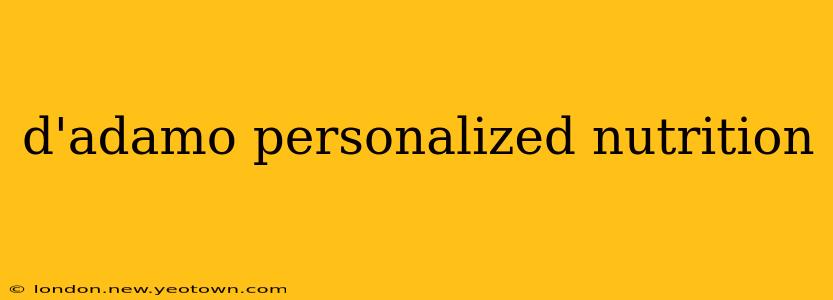The world of nutrition is vast and often confusing. We're bombarded with conflicting advice, fad diets, and promises of miraculous weight loss. But what if your ideal diet wasn't a one-size-fits-all approach? This is the core principle behind Dr. Peter D'Adamo's personalized nutrition plan, which centers around your blood type. While controversial, the D'Adamo diet, also known as the blood type diet, has captivated millions with its promise of tailored wellness. Let's delve into the details, exploring its claims, criticisms, and the science (or lack thereof) behind it.
What is the D'Adamo Blood Type Diet?
Imagine a diet specifically designed for your unique genetic predispositions. That's the central concept of the D'Adamo blood type diet. Dr. D'Adamo, a naturopathic physician, theorizes that your blood type significantly influences your digestive system, immune response, and overall health. He proposes that certain foods are compatible or incompatible with your blood type, affecting your metabolism and susceptibility to various health issues.
The diet categorizes foods into four groups based on blood types: A, B, AB, and O. Each blood type has a recommended food list and a list of foods to avoid or limit. For example, those with type O blood are often encouraged to consume meat and vegetables while limiting dairy. Type A individuals may benefit from vegetarian-based diets. The logic behind this stems from the idea that different blood types evolved in different environments and therefore have different nutritional needs.
How Does the D'Adamo Diet Work? (According to the Theory)
The core of the D'Adamo diet rests on the idea of lectins. Lectins are proteins found in many foods that can bind to cells in your body, potentially triggering an immune response. Dr. D'Adamo argues that certain lectins are more likely to react negatively with specific blood types, leading to inflammation, weight gain, and other health problems. By consuming foods that are "compatible" with your blood type, you supposedly minimize these negative reactions.
What are the Different Blood Types and Their Dietary Recommendations?
This is a simplified overview and shouldn't replace consultation with a healthcare professional.
- Type O: Often described as the "hunter" blood type, it's generally recommended to follow a high-protein, meat-focused diet rich in vegetables. Dairy and grains are typically restricted.
- Type A: This is often called the "farmer" blood type, and the diet emphasizes vegetarian foods like fruits, vegetables, and legumes. Meat consumption is generally discouraged.
- Type B: Considered the "nomadic" blood type, it offers more flexibility, allowing for a broader range of foods including both meat and dairy.
- Type AB: The "enigmatic" blood type, combining features of both A and B, suggesting a balanced diet with elements from both A and B recommendations.
Does the D'Adamo Blood Type Diet Really Work? The Scientific Perspective
While the D'Adamo diet enjoys a sizable following, it's crucial to understand that scientific evidence supporting its claims is limited and often contested. Many studies have failed to demonstrate a significant link between blood type and optimal dietary choices. Critics point to the lack of rigorous scientific research backing the diet's claims and argue that general healthy eating principles are more effective than restrictive blood-type based approaches.
Is there scientific evidence to support the claims of the D'Adamo diet?
Currently, there is no strong scientific consensus supporting the core tenets of the D'Adamo blood type diet. While some individual components of the diet, like emphasizing fruits, vegetables, and lean proteins, are beneficial for overall health, the blood type connection lacks robust evidence. More research is needed to definitively validate or refute its claims.
What are the potential benefits and risks of following the D'Adamo diet?
Potential benefits might include improved digestion for some individuals due to the elimination of certain foods they may be sensitive to. However, risks include nutritional deficiencies from restricting entire food groups, and potential social isolation if the diet significantly limits social eating opportunities. It's crucial to consult a healthcare professional before making any drastic dietary changes.
What are the alternatives to the D'Adamo diet?
Many alternative dietary approaches focus on balanced nutrition, incorporating a variety of fruits, vegetables, lean proteins, and whole grains. These diets are typically supported by a wider range of scientific evidence compared to the D'Adamo diet. A registered dietitian can help design a personalized eating plan that caters to your individual health needs and preferences.
Conclusion
The D'Adamo blood type diet has gained significant popularity, but its scientific backing remains questionable. While the concept of personalized nutrition is appealing, it's vital to approach such diets with caution and critical evaluation. Consulting a registered dietitian or healthcare professional is recommended before making significant changes to your diet, regardless of your blood type. A balanced approach to nutrition, focusing on whole foods and regular exercise, remains the cornerstone of a healthy lifestyle.

